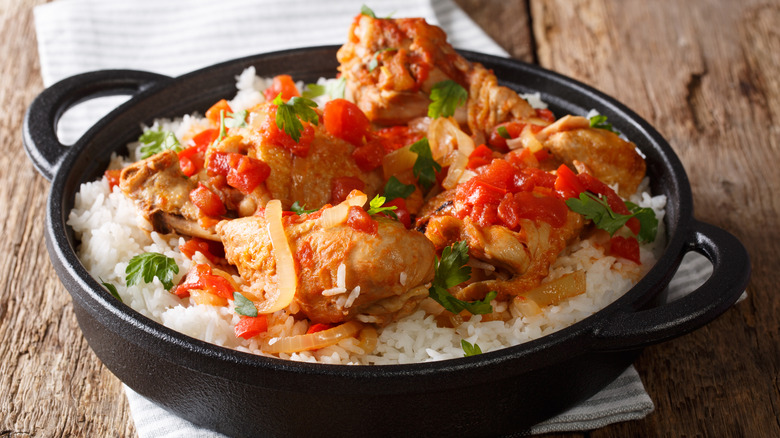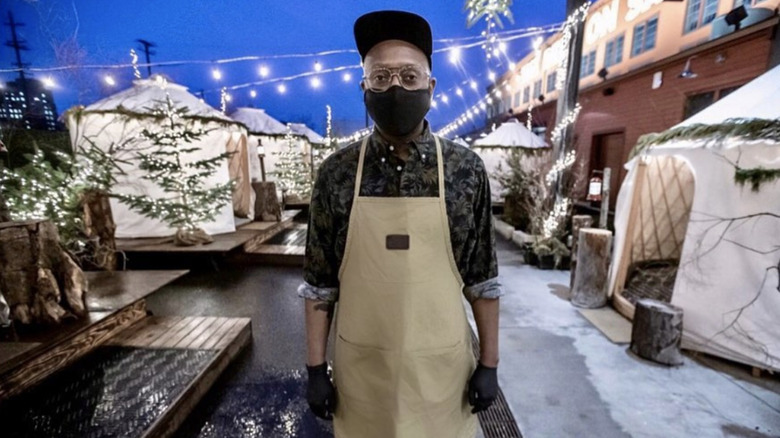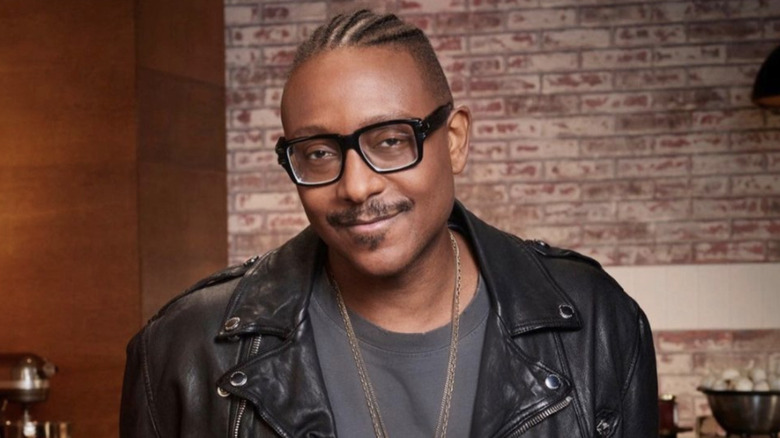The Untold Truth Of Top Chef's Gregory Gourdet
Stylish, tattooed, and bespectacled, chef Gregory Gourdet is one of the most instantly recognizable former contestants — and recent guest judges — of "Top Chef," Bravo TV's long-running series that recently aired its 18th season (via Bravo TV). Both as a competitor on the show as well as during his appearances as a guest host/judge, Gourdet has become known for his soft-spoken, gentle demeanor and his killer cooking chops. A Queens, New York native who honed his kitchen skills in Jean-Georges Vongerichten's Asian-fusion empire of restaurants in the early 2000s, Gourdet later moved to Portland, Oregon, where he became a staple fixture of that city's food-obsessed scene as the executive chef at the Nines Hotel (via The New York Times).
Gourdet is perhaps best known for his appearances on "Top Chef." During season 12 in Boston, Gourdet narrowly lost out to Los Angeles chef Mei Lin (via Bravo TV). During season 17's "All-Stars" competition in Los Angeles, Gourdet was a finalist, and in the show's most recent season, he appeared in multiple episodes taking on hosting and judging duties alongside Tom Colicchio and Padma Lakshmi.
Gourdet's story is a multifaceted one that includes both obstacles and triumphs. Read on to learn more about this admired chef and television personality.
Gourdet's Haitian roots strongly influence his cooking
The son of Haitian immigrants (per The New York Times), Gourdet, in recent years, has deepened his understanding of Haitian cuisine, culminating in his first restaurant, Kann, which is set to open in Portland in mid-2022 (via Oregon Live). According to Food & Wine, the chef started his deep dive into exploring the cuisine of his roots in the mid-2000s. "I went back to Haiti and just started cooking with my mom in Florida anytime I could and my sister in Atlanta," he told the magazine.
In 2018, Gourdet hosted a dinner at the James Beard House in New York titled "Haiti In My Heart," at which the chef and his team prepared salt cod patties, twice-cooked griot pork, kreyol stewed chicken, and more (via James Beard). And on season 17 of "Top Chef All Stars," Gourdet debuted an early version of Kann — the Creole word for "sugar cane," which vendors in Haiti call out on the street, reports Food & Wine – for the show's famous "Restaurant Wars" episode, serving some of the same dishes along with the traditional Haitian pickles called pikliz, as well as a roasted red snapper (also via Food & Wine). Gourdet's restaurant concept won the night.
Gourdet's highly anticipated Kann was delayed by the pandemic
Fresh off his successes exploring and debuting his deepened understanding of Haitian cuisine, Gourdet secured a location for his first restaurant, Kann, in the chef's adopted city of Portland, Oregon (via Oregon Live). Originally set to open in December 2020, the restaurant's debut was shelved due to the confusion and disruption of the COVID-19 pandemic. Now expected to open its doors in mid-2022, Kann was previewed in the form of Kann Winter Village, which served a six-course, $210 tasting menu in Portland's event space The Redd during the winter of 2021. Guests raved about dishes, including a warm kale, apple, and plantain salad; a homey chicken stew studded with potato dumplings; creamy peanut collard greens; braised short ribs; and rice with lima beans (via Oregon Live).
"What we're presenting is the story of my heritage and my dive into Haitian cooking with the recipes that my family made when I was growing up and the dishes that are iconic to Haiti," Gourdet said of the preview version of Kann (via Resy).
The Portland 'Reckoning' also had an impact on his restaurant plans
In July 2020, "the reckoning," as it's referred to by those involved, shook the Portland restaurant industry (via Portland Eater). At that time, Maya Lovelace, chef at Portland restaurants Yonder and Mae, published a series of posts on her Instagram account accusing various Portland restaurant owners of questionable or disrespectful conduct. She then put out an open call for people to share similar stories of the Portland restaurant scene with her, which she would then share on her Stories.
According to Eater, Lovelace shared screenshots of messages from former workers discussing the environment at Departure, the rooftop restaurant at the Nines Hotel, where Gregory Gourdet was, at the time, executive chef. The messages alleged sex discrimination, a gender pay gap, and instances of male managers commenting on the appearance of female employees. The messages indicated that Gourdet didn't do enough to curtail this type of behavior.
According to The New York Times, Gourdet denied the accusations, noting that since he didn't own the restaurant, his power was limited. But he "listened to every single one of them." Gourdet has taken the event to heart in his preparations to open Kann. According to the Times, his new kitchen staff is largely populated by people of color and women; additionally, all employees other than managers are paid the same salary, with tips split between the dining room and kitchen staffs.
"The pandemic has really ravaged us as a community, and the reckoning has really ravaged us," Gourdet told the paper. "I'm here to see it get rebuilt."
Addiction - and recovery - have shaped Gourdet's life
Gourdet has been open about his addiction and recovery story, which he has said have shaped his life. In an excerpt from his book "Everyone's Table: Global Recipes for Modern Health," posted at "Today," Gourdet wrote that his "first dalliance" with alcohol occurred during high school.
"40s of Olde English snuck into a Manhattan movie theater ... produced an electrifying sense of lightness, a bodily freedom I had never felt before," he wrote. "I chased that freedom for years, sneaking slugs of my parents' Barbancourt straight from the bottle after they had gone to bed, then graduating to smoking weed and dropping acid to snorting ketamine, small-town meth, and cocaine and cocaine."
Even as he was sinking into addiction, Gourdet wrote, he was discovering a love for cooking. In culinary school, he "inhaled" his classes but "kept partying" (via "Today"). After graduating, Gourdet quickly landed a job working for the celebrity chef Jean-Georges Vongerichten, but was later fired after too many long nights of drinking and using began to affect his work. Later, after a devastating alcohol-induced car crash on New Year's Eve, Gourdet committed to the years-long project of getting sober.
"I took stock of the years I'd spent battering my body and decided on a revolutionary course of action — to care for it instead," Gourdet wrote. "And like I once did with partying, I went all in. I did yoga, I became a gym rat, I got way into CrossFit and I ran until I had done fifty marathons and ultramarathons."
He's a health and fitness enthusiast
Since becoming sober, chef Gregory Gourdet has fully embraced a lifestyle of wellness characterized by frequent exercise and a healthy diet. As he wrote in "Everyone's Table," shifting his diet, for Gourdet, began with a suggestion from his CrossFit coach to try the paleo diet, which is characterized by eating lots of high-quality meats, fruits, and vegetables, but little to no grains or gluten (via Healthline).
"This way of eating is at the core of so many of the best eating regimens, old and new, from the Mediterranean diet to Whole30: whole, natural foods, plenty of good fats, nutrient-rich carbs, and meat and seafood raised and harvested by thoughtful farmers and fishers," Gourdet wrote. "It's a durable consensus that I like to think of as modern health — not a crash diet but a sustainable lifestyle."
Those dietary principles have influenced the recipes found in Gourdet's first cookbook, "Everyone's Table: Global Recipes for Modern Health." Inside, dishes such as coconut-creamed collard greens, spice-crusted pork chops with cherries, and pan-roasted sweet plantains tempt, even as they stick to healthy ingredients and a lack of processed items such as refined oils and granulated sugar.
"Unless I told you, you probably wouldn't notice that all two hundred recipes are free of gluten, dairy, soy, refined sugar and legumes," Gourdet wrote. "You wouldn't notice — and that's the point. All you'd see is food you want to make."





